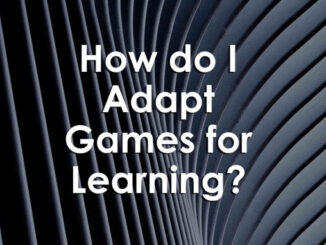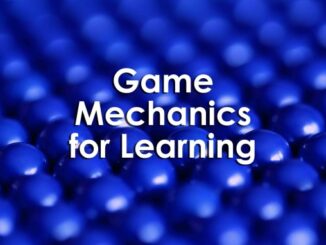
Ludogogy has entered into an agreement with Gamification Journal, based in Seoul, South Korea, for the mutual exchange of articles. This is the fourth of those articles we are publishing and it was in exchange for Dave Eng’s article about Gamer Grind from the previous issue, themed Economics
There are many moving parts in a game. For example, there are various systems to implement movement and other aspects of the interface, the gameplay needs to be designed to provide a ‘balanced’ experience, and the narrative needs to drive the game forward. The more creativity the game allows on the part of the player, generally, the higher the difficulty of the gameplay. So it is often necessary to provide a help system, or guides and tutorials so that players can realise the developer’s intention for how the game can be played.
Role Playing Games (RPGs), especially, naturally includes these assistive contents linked to the quest system. So as players undertake quests they are also learning how to play the game. This can be implemented in various ways according to the user interface, but the Ask-Progress-Reward structure through NPC (Non-Player Characters) is very widely-used.
Quests Advance Narrative
Another way in which quests are used is to advance the narrative of a game. In the case of RPGs which are largely story-driven, types of quest can include scenario quests (the main story arc), side-quests (not required as part of the main story arc), epic quests (made up of many sub tasks), and recurring quests. Completed quests are linked to the ‘achievement system’ and used as end content.
So, quests in RPG games increase the immersion in the game world and the fun derived from playing as well as forming the basis of the theme and acting as the core of the gameplay.

Making Recurring Actions Fun
In gamification, using a quest structure is all about making recurring actions fun. From a general game development perspective, the same effect can happen when creating quests which are connected to the same game area or monster, or other types of grinding. A quest can make these familiar or repetitive activities less boring by attaching different narratives.
The recently published game, Elden Ring by FromSoftware, includes activities such as spellcrafting and casting, combat and crafting. Fun can be derived from playing this game just by hunting and fighting with the AI monsters. A player who is good at this activity can continue to play indefinitely, but will eventually face the ‘hurdle of growth’ because Elden Ring is also an RPG with level design. Eventually, there will come a time that the player will want to level up their character to increase their capabilities. Elden Ring which is created as an open world does not offer smooth integration of quest structures and doesn’t officially provide recurring quests as a vehicle for characters to grow. However, the player will instinctively tries a ‘value-based approach’ to find a good hunting place based on efficiency (of monster kills) per hour.


Regardless of the developer’s intention, the player finds that the more efficient play is, in terms of time, and value [time ⅹ number of trials = rewards], the more fun the player has when participating in recurring play. This can be thought of as ‘making recurring structures fun’.
Value-based Quest Design
In general, in RPGs, hunting monsters repeatedly guarantees experience points and game currency, but it’s related to randomized item tables. However, quests offer fixed and systemized rewards, for achievement, in addition to hunting-based rewards. This process can be a way of providing an ‘economic’ balance in line with the developer’s intention.

This repetitive quest structure is mainly used in MMORPG systems with a long growth period, and is implemented through narratives having various objectives such as ‘Catch # number of characters!’ or ‘Get ## number of ABC item after hunting the specific monster!’, etc. Reward-based recurring quests make the player seek higher rewards. Through this process, the past recurring quest is discarded. The idea of ‘continuous quest’ allows flexible design which combines higher reward quests (often ‘grinds’ which need to be well rewarded to keep players performing them) and interesting quests (the novel, non-grinding type).

Different Kinds of Fun
World of Warcraft especially focused on linking quests to experience points. The experience points gained by finishing single quests are much higher than those for hunting the monsters one by one. This design gives MMORPGs such as WoW a more plot-based structure, as opposed to an action combat-based adventure, which could be seen as ‘more fun’.
Different kinds of ‘fun’ are offered by WoW and Elden Ring, simply by changing the balance of rewards between monster hunting and quests. If more experience points are offered for killing monsters, you derive the kind of fun offered by Elden Ring. On the other hand, if the experience points for monsters are low and a greater amount of experience points are rewarded for quests, the fun of World of Warcraft results. This is because the player will always derive greater enjoyment of the game by seeking optimal efficiency.
The Gamification of Learning
In gamification of learning, and in creating learning games, the lessons of RPGs and their quest structures can be taken on board by designers, to create balanced designs which match the appropriate form of fun to learning outcomes.
For example, the quest structure can be mapped to outcomes which require longer-term practice or application of the learner’s cognitive skills. The shorter-term ‘fun’ equivalent to the monster hunting can be prioritized where learners need to act quickly (or repetitively), in order to reach the desired outcomes.
These structures, are, of course, completely independent of subject matter, and so learning designers should not make the mistake that they have nothing to offer more ‘serious’ settings, simply because their origins are in high-fantasy games. In workplace learning, for example, we are all playing ‘roles’, and learning is the means by which we ‘level up’ in both life and work.
- Quest systems in Role Playing Games - 6th April 2022





Be the first to comment